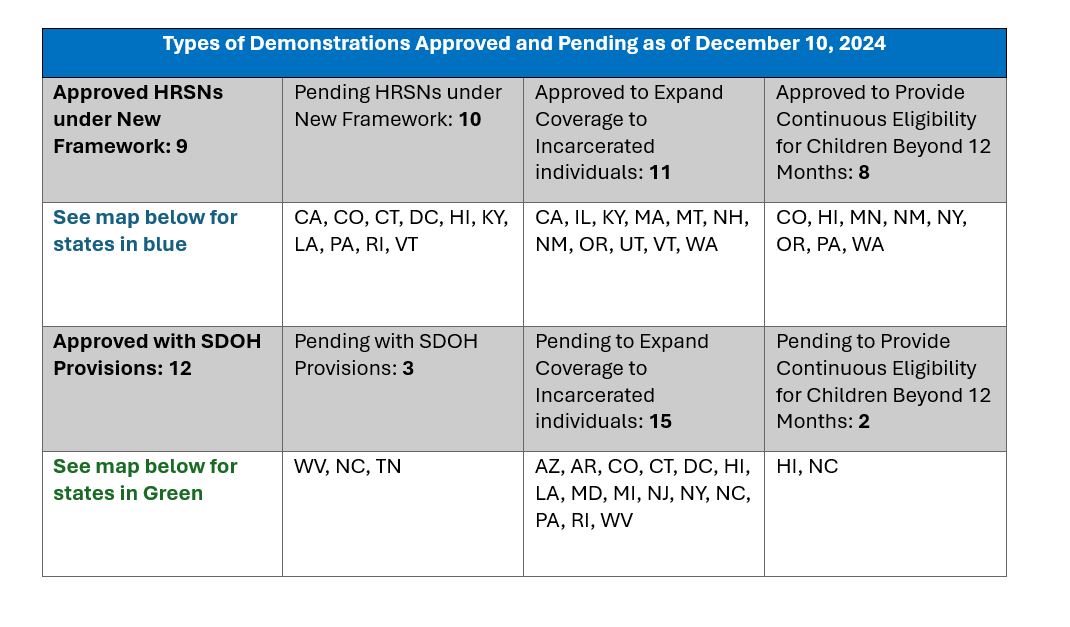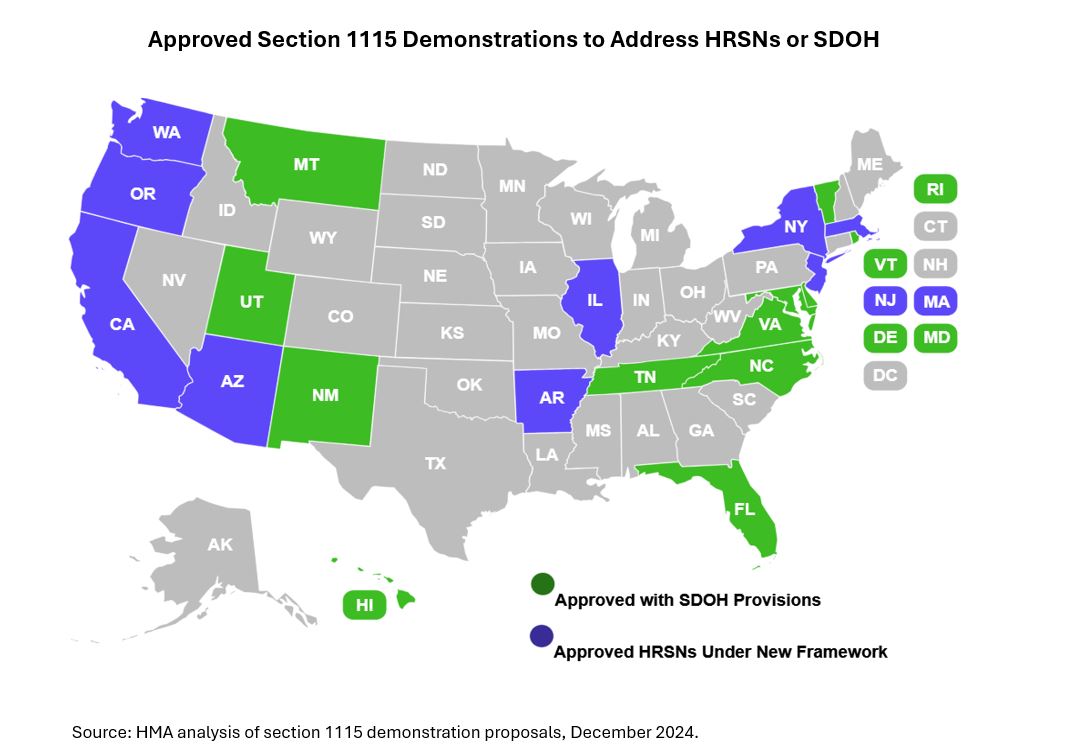This week’s In Focus section summarizes states’ Medicaid Section 1115 demonstration priorities over the last four years and highlights predicted changes coming with a new presidential administration. In the waning days of any presidency, regardless of party, reviewing and approving pending Section 1115 applications that reflect the current administration’s key policy initiatives is a priority for officials at the Centers for Medicare & Medicaid Services (CMS).
Each administration has discretion over which Section 1115 demonstrations to encourage and approve. Though specific Medicaid priorities under the upcoming Trump Administration are still nascent, Health Management Associates, Inc. (HMA), federal, and state experts are monitoring these developments. This article describes a subset of the signature initiatives the Biden Administration permitted states to pursue in their Medicaid Section 1115 demonstrations and how the new administration could focus on different priorities, rescind existing guidance, or potentially withdraw already approved waivers.
Overview of Biden-Era Section 1115 Demonstration Initiatives
CMS-approved Section 1115 demonstrations permit alternative methods to improve the accessibility, coverage, financing, and delivery of healthcare services under joint federal-state funded programs, specifically Medicaid and the Children’s Health Insurance Program (CHIP).
Addressing health disparities and promoting integrated care in Medicaid became a primary focus of the Biden Administration. In November 2023, CMS introduced a Medicaid and CHIP Health-Related Social Needs (HRSN) Framework, giving state Medicaid agencies the opportunity to address the broader social determinants of health (SDOH) that affect their enrollees, leading to better health outcomes. The new initiatives were not intended to replace other federal, state, and local social service programs, but rather to coordinate with those efforts. HRSN demonstration approvals to date include coverage of rent/temporary housing and utilities for up to six months and nutrition support (up to three meals per day), departing from longstanding prohibitions on payment of room and board in Medicaid.
During the present administration, CMS also has provided novel opportunities for states to adopt strategies that promote continuity of Medicaid coverage, mainly through bolstering Section 1115 demonstrations to provide multiyear continuous eligibility for children. In addition, CMS released guidance in April 2023 so states could apply for a new Section 1115 demonstration opportunity to test transition-related strategies that support community reentry for incarcerated people who would otherwise be eligible for Medicaid or CHIP.
The table and map below show the types of demonstrations approved and pending to date. We anticipate that incoming administration officials will closely examine the four demonstration initiatives outlined as they determine their own Medicaid policy agenda and priorities. Under President Biden’s Administration, nine states received federal approval for HRSN demonstrations under the new framework. Another 10 states have applications pending.


Rescissions and renewals. Incoming Trump Administration officials technically could attempt to rescind some of the Section 1115 demonstrations approved during the Biden Administration. The Biden Administration unsuccessfully pursued with, a similar strategy for certain 1115 demonstration components approved during President-Elect Trump’s first term. Like the Biden Administration, the incoming Trump officials may choose not to renew demonstrations, even if the courts prevent them from rescinding approvals.
Any signature Section 1115 policy is unlikely to emerge until the new administration’s policy officials are in place. There are, however, important insights to consider based on the first Trump Administration’s priorities and areas of common ground across the Biden and first Trump administrations.
Signature 1115 initiatives. During President Trump’s first term, one signature Medicaid Section 1115 initiative allowed states to apply work requirements to some eligibility groups. CMS officials at that time also approved capped allotments for certain components of a state’s Medicaid program. Some states might consider revisiting these options with incoming administration officials. Two other key policy areas to watch following the transition include:
- The first Trump Administration approved a pilot program to test interventions addressing HRSNs in North Carolina’s Medicaid 1115 demonstration program. Though the approved HRSNs were less expansive than the HRSN 1115 interventions later announced by the Biden Administration, this could be an area of common ground where the policy evolves and can be incorporated into discussions on other nascent initiatives.
- Multiple administrations, including the first Trump Administration, have prioritized Medicaid policies and demonstration initiatives to address substance use disorders (SUD) and, separately, reentry. The intersection of these issues can provide another area of common ground and opportunity to continue work on state reentry initiatives, though likely with new and modified parameters.
Implementation Considerations
Federal approval of Medicaid Section 1115 demonstration proposals is a critical milestone for states. Demonstration implementation also requires significant and ongoing leadership, resources, and collaboration between states and CMS and states and their partners.
The type of state demonstration activity is expected to shift dramatically over the course of the new administration. For example, proposals may shift from expansions in coverage and benefits to reflect the new administration’s other priorities. States, too, may consider alternative approaches to Section 1115 demonstrations, such as state plan authorities like in lieu of services (ILOS), to pursue certain innovative approaches that they might otherwise have implemented with demonstration authority.
Connect with Us
HMA empowers states, providers, and other stakeholders to thrive in an ever-changing healthcare landscape. With deep expertise at every level, HMA teams support state Medicaid programs and stakeholder partners nationally to address a range of operational challenges, including designing innovative healthcare approaches to address urgent healthcare challenges, expanding coverage opportunities, and optimizing integration to address program efficiencies and improved “whole person” care.
We have expertise in all of the components critical to developing Section 1115 programs—from the policy knowledge, to actuarial/budgeting talent, to communications and project management skills, as well as the necessary IT infrastructure.
Contact our featured experts below to learn more about HMA’s capabilities and expertise.


